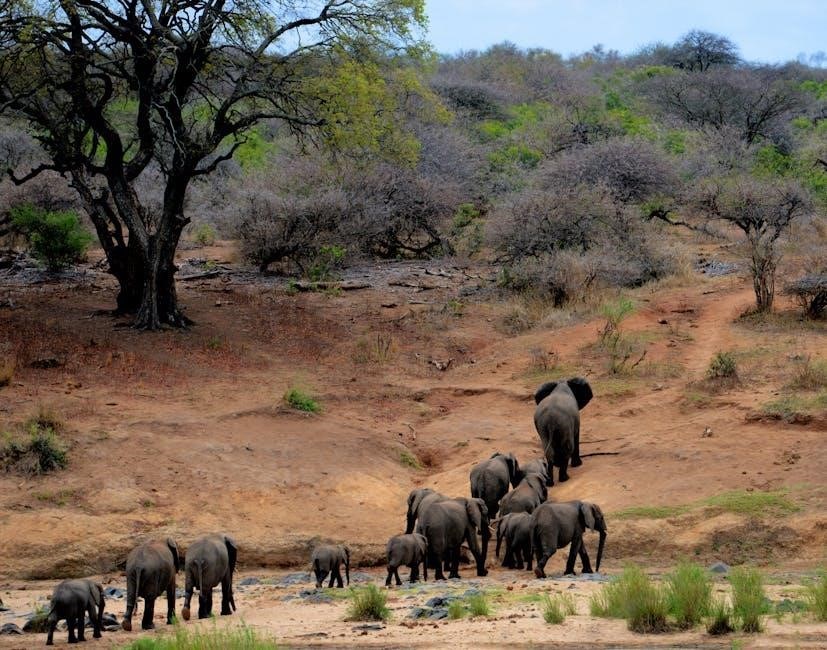shooting an elephant by george orwell pdf
George Orwell’s “Shooting an Elephant” is a thought-provoking essay exploring themes of colonialism, moral conflict, and personal accountability in British-ruled Burma. The narrative delves into the complexities of imperialism and the psychological turmoil faced by the protagonist, offering a profound critique of colonial authority. This controversial work remains a significant piece of modern literature, sparking debates on morality and power dynamics.
Overview of the Essay
“Shooting an Elephant” by George Orwell is a compelling narrative that recounts the author’s experiences as a British police officer in colonial Burma. The essay vividly describes an incident where the protagonist is pressured to shoot a rampaging elephant, exploring themes of imperialism, moral conflict, and the psychological burden of colonial authority. Orwell’s narrative probes the complexities of power dynamics, highlighting how fear of judgment and the need to maintain authority drive decisions. The essay is both a personal reflection and a broader critique of colonialism, offering insights into the moral dilemmas faced by individuals within oppressive systems. Its controversial nature and timeless themes continue to resonate with readers, making it a cornerstone of modern literary analysis.
Significance of the Title
The title “Shooting an Elephant” holds deep symbolic and literal meaning, reflecting the central conflict of the essay. The act of shooting the elephant represents the destructive nature of colonialism and the moral dilemmas faced by individuals within oppressive systems. The elephant, a majestic and harmless creature, symbolizes the innocent victims of colonial exploitation. Orwell’s decision to shoot the elephant, driven by fear of humiliation rather than necessity, underscores the theme of conformity to societal expectations. The title encapsulates the essay’s exploration of power, guilt, and the loss of moral autonomy, making it a powerful metaphor for the broader critique of imperialism and human behavior.

Background of George Orwell
George Orwell, born Eric Arthur Blair in 1903 in Motihari, British India, was a British writer whose experiences in colonial Burma shaped his critical perspectives on imperialism and societal norms, influencing works like Shooting an Elephant.
Early Life and Career
George Orwell, born Eric Arthur Blair on June 25, 1903, in Motihari, British India, grew up in a colonial family. He attended St. Cyprian’s School in England, where he developed a passion for writing. Orwell pursued his education at Eton but chose not to attend university, instead joining the Indian Imperial Police in Burma in 1922. This experience deeply influenced his views on colonialism. Returning to Europe in 1927, he worked as a police officer in Paris before adopting a bohemian lifestyle, living as a tramp to understand societal inequalities. His early writing career began with essays and novels reflecting his experiences, setting the stage for his later literary success.
Orwell’s Experience in Burma
George Orwell served in Burma as a Sub-Divisional Police Officer from 1922 to 1927. His time there exposed him to the harsh realities of colonial rule, shaping his critical views on imperialism. Orwell witnessed firsthand the oppression of the Burmese people by British authorities, which fueled his moral discomfort. The experience influenced his writing, particularly in “Shooting an Elephant,” where he reflects on the moral dilemmas and societal pressures faced during his tenure. Orwell’s Burmese years were pivotal in forming his political consciousness and literary themes, ultimately leading to his decision to resign from the police force and pursue a career in writing.

Themes in “Shooting an Elephant”
Colonialism, moral conflict, and societal pressure are central themes, as Orwell grapples with imperialism’s ethical dilemmas and the psychological burden of conforming to expectations in Burma.
Imperialism and Colonialism
Imperialism and colonialism are central themes in “Shooting an Elephant,” as Orwell critiques the moral corruption and exploitation inherent in colonial rule. The essay vividly portrays the oppressive dynamics of British colonialism in Burma, where the native population is subjected to systemic subjugation. Orwell’s narrative highlights the psychological and ethical dilemmas faced by colonial officers, who often acted against their moral judgment to maintain authority. The elephant, a symbol of Burma’s oppressed people, represents the destructive consequences of imperial power. Orwell’s personal account exposes the hypocrisy and brutality of colonialism, offering a scathing critique of how imperialism dehumanizes both the colonizer and the colonized. His reflections underscore the broader implications of colonial rule and its lasting impact on societies.
Moral Conflict and Guilt
Orwell’s essay vividly portrays the moral conflict and guilt he experienced as a colonial police officer. The decision to shoot the elephant, driven by the fear of appearing weak before the crowd, highlights his internal struggle between personal morality and societal expectations. Orwell admits that the act was unnecessary and motivated by a desire to maintain his authority, rather than any genuine threat posed by the elephant. This moral dilemma reflects the broader ethical complexities of colonial rule, where individuals often acted against their conscience to uphold imperial norms. The essay underscores the psychological toll of such conflicts and the lasting guilt Orwell felt for his actions.
The Pressure of Peer Opinion
The pressure of peer opinion plays a pivotal role in Orwell’s decision to shoot the elephant. Despite recognizing the act as morally wrong, he feels compelled to act due to the presence of a crowd. The fear of appearing cowardly or losing face in front of the Burmese onlookers drives his choice, illustrating how societal expectations can override personal judgment. This phenomenon reflects the broader human tendency to conform to group norms, even when it conflicts with individual morality. Orwell’s narrative serves as a powerful critique of how external pressures can lead individuals to act against their conscience, highlighting the destructive nature of such conformities in colonial and societal contexts alike. The crowd’s influence becomes a metaphor for the oppressive forces of peer opinion, shaping actions that might otherwise be avoided. Through this lens, Orwell’s essay remains a timeless commentary on the dangers of yielding to societal expectations. Furthermore, it underscores the internal conflict faced by individuals trapped between personal ethics and collective judgment, a theme that resonates deeply in both historical and contemporary settings. Orwell’s portrayal of this moral struggle emphasizes the enduring relevance of his work in understanding the complexities of human behavior under social pressure. The essay ultimately serves as a cautionary tale about the consequences of prioritizing appearance over authenticity, a lesson that transcends the colonial context to speak to universal human experiences. By examining the interplay between individual will and collective opinion, Orwell’s narrative provides a profound exploration of the compromises made in the face of societal expectations, offering insights into the psychology of compliance and the erosion of moral integrity. This subheading delves into the specific dynamics of peer pressure within the essay, separating it from broader themes of colonialism and personal guilt to focus on the immediate social forces that influenced Orwell’s decision. The pressure of peer opinion emerges as a critical factor in the narrative, shaping the protagonist’s actions and underscoring the fragility of moral resolve in the face of public scrutiny.
The Symbolism of the Elephant
The elephant in Orwell’s essay serves as a powerful symbol of colonial oppression and the destruction of innocence. It represents the majestic and untamed aspects of Burma, which are ultimately destroyed by the oppressive forces of imperialism. The elephant’s death symbolizes the loss of freedom and the moral corruption that accompanies colonial rule. Orwell’s act of shooting the elephant, despite recognizing its futility, underscores the theme of destructive impulses driven by societal expectations. The elephant also embodies the idea of something greater than human control, which is irrevocably harmed by human actions. This symbolism reinforces the essay’s critique of colonialism and its devastating consequences on both the oppressed and the oppressors, highlighting the broader implications of unchecked power and moral compromise. Through the elephant’s fate, Orwell vividly illustrates the tragedy of colonial domination and its impact on individual and collective conscience.

Plot Summary
In British-ruled Burma, a police officer faces moral conflict during an elephant’s rampage. His reluctant decision to shoot the elephant highlights the destructive nature of colonial authority and personal accountability.
The Incident in Moulmein
The story begins in Moulmein, Lower Burma, where Orwell, as a young police officer, faces a moral dilemma. A rogue elephant, driven mad by musth, ravages the bazaar, destroying property and killing a man. The local population expects Orwell to intervene, despite his reluctance. The incident symbolizes the oppressive nature of colonial rule, as Orwell feels pressured by the crowd’s expectations. The elephant’s rampage mirrors the chaos of imperialism, while Orwell’s internal conflict reflects the moral struggles of enforcing colonial authority. The event sets the stage for exploring themes of power, guilt, and the complexities of human decision-making under oppressive systems.
The Decision to Shoot the Elephant
Orwell’s decision to shoot the elephant is driven by the pressure of public opinion rather than necessity. Despite recognizing the elephant’s calm state, he fears appearing weak in front of the Burmese crowd. The act becomes a symbolic submission to colonial expectations, highlighting the pervasive influence of societal judgment. Orwell’s internal conflict underscores the tension between personal morality and external pressures, illustrating how authority can lead to morally questionable actions. This pivotal moment in the essay reveals the destructive nature of imperialism, where fear of losing face overshadows ethical considerations, ultimately leading to a tragic and unnecessary outcome.
The Aftermath of the Shooting
After shooting the elephant, Orwell is met with a mix of reactions. The crowd, initially excited, disperses as the elephant’s slow and agonizing death becomes clear. Orwell feels a deep sense of guilt and moral unease, realizing the act was unnecessary and driven by pride. The Burmese people, though silent, seem to understand the futility of the action. The incident leaves Orwell questioning the moral implications of colonial authority and the true cost of maintaining power. The aftermath underscores the emotional and ethical toll of imperialism, as Orwell grapples with the consequences of his decision, highlighting the complexities of human behavior under societal pressure.

Analysis of the Essay
Orwell’s narrative masterfully critiques colonialism, using vivid imagery and moral ambiguity to explore themes of power, guilt, and societal pressure, revealing deep psychological complexity.
Orwell’s Narrative Style
Orwell’s narrative style in “Shooting an Elephant” is direct, reflective, and deeply personal, blending autobiographical elements with fictionalized accounts. His use of first-person perspective creates immediacy, drawing readers into the moral dilemmas he faces. The essay’s tone is introspective, with Orwell expressing regret and self-awareness about his actions. His prose is concise yet evocative, painting vivid scenes of colonial Burma and the psychological turmoil of the protagonist. By employing a straightforward yet emotionally charged narrative, Orwell critiques imperialism and human weakness, making the essay both a personal confession and a broader commentary on colonialism’s ethical complexities.
Use of Irony and Satire
Orwell employs irony and satire masterfully in “Shooting an Elephant” to critique colonialism and human nature. The central irony lies in the protagonist’s decision to shoot the elephant, not out of necessity, but to avoid humiliation before the crowd. This act, meant to assert authority, ultimately underscores the absurdity of colonial power dynamics. Orwell’s satire targets the hypocrisy of imperialism, where the British claimed to bring order but often perpetuated arbitrary violence. The crowd’s enthusiasm for the spectacle adds a layer of dark humor, highlighting the moral emptiness of colonialism. Through these techniques, Orwell exposes the flaws in both individual and systemic behavior, delivering a scathing critique of colonial rule and its psychological toll on all involved.
Psychological Insights into the Protagonist
The protagonist of “Shooting an Elephant” is portrayed as a deeply conflicted individual, grappling with the moral and psychological burdens of colonialism. Orwell’s narrative reveals a man torn between his duty as a British officer and his internal revulsion at the senseless violence he is about to commit. The pressure of public opinion and the fear of appearing weak drive his decision to shoot the elephant, showcasing the psychological toll of imperialism on both the oppressor and the oppressed. The protagonist’s actions are motivated less by necessity than by the need to maintain a facade of authority, exposing the fragility of colonial power and the personal guilt that accompanies it. This internal struggle highlights the human cost of imperialism and the moral complexities of conformity.

Historical Context
The essay is set during British colonial rule in Burma in the 1920s, a period marked by oppression and rising anti-European sentiment among the local population.
British Colonial Rule in Burma
During the 1920s, Burma was under British colonial rule, which fostered widespread resentment among the local population. The British exploited Burma’s resources, leading to economic and social disparities. Orwell’s experiences as a police officer in Moulmein exposed him to the harsh realities of colonial governance. The British Empire’s presence in Burma was marked by oppression, with locals subjected to forced labor and land confiscation. Anti-European sentiment was rampant, yet overt rebellion was rare, as the British maintained control through fear and authority. This backdrop of colonial tension forms the setting for Orwell’s essay, where the elephant becomes a symbol of the oppressive regime and the moral dilemmas faced by its enforcers.
The Role of the Police in Colonial Societies
In colonial societies, police officers like Orwell served as enforcers of British authority, maintaining order and suppressing dissent. Their role was to uphold colonial law, often at the expense of local customs and rights. Police officers were viewed with suspicion by the native population, who saw them as symbols of oppression. The pressure to maintain colonial control often led to moral compromises, as officers were forced to act against their conscience to preserve authority. Orwell’s essay highlights the psychological conflict faced by these officers, trapped between duty and empathy, illustrating the ethical dilemmas inherent in their role as representatives of colonial power.

Symbolism and Metaphors
The elephant symbolizes oppression and colonial tyranny, while the crowd represents collective guilt and societal pressure. Orwell uses these symbols to critique imperialism and human behavior.
The Elephant as a Symbol of Oppression
The elephant in Orwell’s essay serves as a powerful symbol of oppression, representing the overwhelming force of colonial rule and its impact on native populations. The creature’s massive size and strength embody the oppressive nature of imperialism, which crushes individual and collective resistance. The elephant’s rampage through the village mirrors the destructive effects of colonialism, where indigenous cultures and lives are disrupted by external powers. Orwell’s decision to shoot the elephant, despite its calm state, symbolizes the arbitrary and violent enforcement of colonial authority. The elephant’s death becomes a metaphor for the destruction of native autonomy and the moral corruption inherent in imperial systems. Through this symbolism, Orwell critiques the exploitation and brutality of colonialism, highlighting its dehumanizing effects on both the oppressed and the oppressors.
The Crowd as a Symbol of Collective Guilt
The crowd in “Shooting an Elephant” represents the collective guilt and complicity of society in perpetuating oppressive systems. Their presence embodies the moral ambiguity of colonialism, where individuals, driven by peer pressure and societal expectations, condone actions that align with authority rather than their own beliefs; The crowd’s eagerness to witness the elephant’s execution symbolizes their passive acceptance of colonial violence. Orwell’s reluctance to shoot the elephant, despite knowing it is unnecessary, highlights the psychological pressure exerted by the crowd. This collective dynamic illustrates how societal norms can lead individuals to act immorally, contributing to the perpetuation of injustice. The crowd’s role underscores the broader theme of shared responsibility in systemic oppression, both in colonial contexts and beyond.

Reception and Criticism
“Shooting an Elephant” has sparked controversy, with debates over its authenticity. Critics praise its critique of colonialism and moral complexity, making it a significant literary work.
Controversies Surrounding the Essay
George Orwell’s “Shooting an Elephant” has long been a subject of debate. Critics question the essay’s autobiographical authenticity, with some doubting whether the incident occurred. Orwell’s decision to shoot the elephant, driven by fear of public humiliation, raises ethical questions about colonial authority and personal morality. The essay’s portrayal of British imperialism in Burma has sparked discussions on its historical accuracy. Additionally, the graphic nature of the elephant’s death has led to criticisms regarding violence and insensitivity. Despite these controversies, the essay remains a powerful critique of colonialism and human psychology, continuing to provoke thought and analysis.
Modern Interpretations and Relevance

George Orwell’s “Shooting an Elephant” remains highly relevant in modern times, offering insights into the dynamics of power, morality, and societal pressure. Contemporary readers interpret the essay as a critique of toxic masculinity and the fear of losing social standing. The themes of imperialism and colonialism resonate with current discussions on global power structures and cultural dominance. The psychological conflict of the protagonist is seen as a universal human struggle, making the essay a timeless reflection on ethical decision-making. Its exploration of guilt and the consequences of unchecked authority continues to inspire new generations of readers and scholars, ensuring its enduring significance in literary and political discourse.

Resources and Downloads
Download the PDF version of “Shooting an Elephant” for free or purchase it from platforms like Wildberries. Study guides, analysis, and additional essays by Orwell are also available online.
PDF Versions of the Essay
Pdf versions of “Shooting an Elephant” are widely available online for free or purchase. Platforms like Wildberries offer the essay in downloadable formats, ensuring easy access. Study guides and analysis accompany many versions, enhancing understanding. Readers can also find it in collections of Orwell’s works, such as “A Fairy Story and Other Essays.” Additionally, educational websites provide free downloads, making it accessible for students and scholars. The PDF format allows for easy reading on various devices, ensuring Orwell’s critical commentary on imperialism remains widely accessible to modern audiences.
Study Guides and Analysis
Study guides and analyses of “Shooting an Elephant” offer in-depth insights into Orwell’s narrative, themes, and historical context. These resources, often accompanying PDF versions, include summaries, critical perspectives, and essay questions. Platforms like Wildberries and educational websites provide access to these materials, aiding students in understanding the essay’s complexities. University resources, such as those from IGNOU, incorporate the essay into broader curricula, exploring its relevance to colonialism and moral dilemmas. Additionally, publications like “Reclam XL Englisch – Text und Kontext” offer detailed analyses, enriching readers’ interpretations of Orwell’s work. These guides are invaluable for scholars and readers seeking to delve deeper into the essay’s significance.
